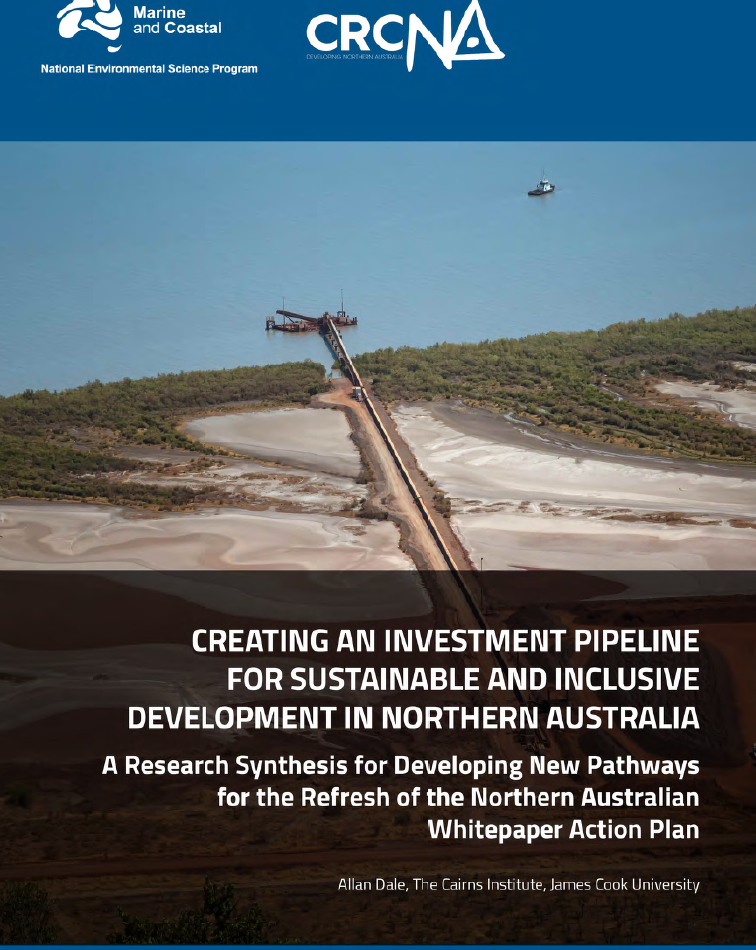Leading Northern Australian academic, Professor Allan Dale has today released The Northern Australia Development Synthesis Report at the Developing Northern Australia Conference (DNAC) to more than 300 attendees in Karratha.
Professor Dale, DNAC Chair and Professor of Tropical Regional Development at the Cairns Institute of James Cook University has developed a comprehensive roadmap of key issues required to achieve sustainable and inclusive development of the north.
With the release of the Australian Government’s ‘Northern Australia Action Plan 2024-2029’ yesterday by the Minister for Northern Australia, the report gives guidance on delivering many of the government’s 17 priorities, highlighting the significant opportunities and challenges faced in the government’s Northern Australia agenda.
Professor Dale explained how the report identifies key strengths and weaknesses within the current policy and program framework, aimed at creating a sustainable investment pipeline across Northern Australia.
“We’re building on more than seven years of strategic research conducted by the Cooperative Research Centre for Developing Northern Australia (CRCNA) and the National Environmental Science Program (NESP) Marine and Coastal Hub, to propose 27 targeted recommendations for the government’s Action Plan process.
“The recommendations focus on enhancing the region’s economic future while addressing social and environmental challenges.”
“The overall investment pipeline, from research and development to finance brokerage and international trade relations, has been carefully considered,” he said.
Speaking from Karratha, Sheriden Morris, Chair of the CRCNA, said Professor Dale’s report underpins the value of foundational research as a resource for policymakers, investors, and communities seeking to contribute to the sustainable development of Northern Australia.
Professor Damien Burrows, NESP Marine and Coastal Hub co-Hub leader said the sustainable and inclusive development of Northern Australia requires all stakeholders to work together to find common ground where we are all connected by our mutual interests.
“This comprehensive and strategically insightful report, resulting from research conducted by the CRCNA and NESP, illustrates a practical example of the power of partnerships between place-based organisations that are staffed and operated out of the very communities they serve,” Professor Burrows said.
Key findings of the report
Research and development: A significant success of the Northern Australia agenda is the establishment of foundational investments in research, development, and extension activities. Programs like the CRCNA and NESP Hubs have significantly contributed to understanding and developing agriculture, First Nations-led business development, strategic environmental issues, and health service delivery. The report strongly recommends continued investment in foundational research, including in emerging sectors such as tourism, energy and decarbonisation.
Finance brokerage and finance: The establishment of targeted concessional loans to support the development of investment pipelines, such as the Northern Australia Infrastructure Facility (NAIF) is a strength of the agenda.
Public sector investment in enabling infrastructure: The 2015 White Paper provided positive collaboration across the Federal, state and territory governments in designing and delivering major publicly funded infrastructure projects such as Beef Roads, Strategic Roads, and later on the Roads of Strategic Important (ROSI) packages.
Key recommendations
Aboriginal and Torres Strait Islander institutions: A significant concern raised by the report is the need for a more cohesive framework for supporting Aboriginal and Torres Strait Islander participation in the region’s development. The report advocates for strengthening Aboriginal and Torres Strait Islander institutions and investment in local governance, country-based planning and economic development. This will ensure First Nations communities determine and lead their own development while protecting their hard-earned rights and interests.
Place-based partnerships: The report recognises that one crucial but overlooked aspect of the current investment pipeline is the need to build place-based partnerships to solve key investment barriers. These partnerships are essential for guiding and initiating strategic actions that turn development ideas into investable projects in Northern Australia.
Regional land use and infrastructure planning: The report emphasises the need for more cohesive and bi-lateral regional and precinct-based land use and infrastructure planning. It suggests that poor planning presents a significant risk to attracting desirable investments in Northern Australia, as well as risks to communities and the environment.
Read the Northern Australia Development Synthesis Report here
Contact: allan.dale@jcu.edu.au
27 August 2024


